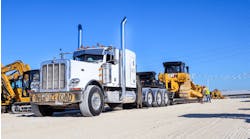The National Highway Traffic Safety Administration recently issued recall notices for commercial vehicles, including brands from Ford, Toyota, and more.
Owners of the affected vehicles should be contacted via U.S. mail over the next two months, but fleet and independent owners of these vehicles can contact the NHTSA Safety Hotline at 888-327-4236 or visit nhtsa.gov for more details. More information on each recall can be found below.
ATC models’ trailer tongue may break and separate from trailer
Aluminum Trailer Company is recalling certain 2013-2025 Car Hauler and 2017-2025 Stacker vehicles. Stress may crack and break the A-frame tongue, separating the tongue from the trailer. A separated trailer tongue can cause a loss of control and increase the risk of a crash.
This recall potentially affects 1,590 vehicles. Dealers will weld additional supports to the tongue tubes. Owner notification letters are expected to be mailed December 9. Owners may call ATC customer service at 877-441-2440, ext. 342.
Ford models’ loss of steering from front control arm separation
Ford Motor Company is recalling certain 2024 Ranger and 2024-2025 Bronco vehicles. The front upper control arm ball joint nut may not have been installed or tightened properly, allowing the front upper control arm to detach from the knuckle assembly. A detached control arm can cause a loss of vehicle steering and control, increasing the risk of a crash.
This recall potentially affects 2,416 vehicles. Dealers will inspect and verify that the ball joint fastener is tightened properly. If a fastener is loose or missing, the dealer will replace the ball joint and knuckle assembly as necessary. Owner notification letters are expected to be mailed on October 28. Owners may contact Ford Customer Service at 866-436-7332. Ford's number for this recall is 24S64.
Ford models’ child seat anchors not properly attached
Ford is recalling certain 2024 Maverick vehicles. The second-row child seat tether anchors may not properly secure a child seat because of an incomplete thread engagement. As such, these vehicles fail to comply with the requirements of Federal Motor Vehicle Safety Standard number 225, "Child Restraint Anchorage Systems." A child seat that is not secured properly increases the risk of injury in the event of a crash.
This recall potentially affects 6 vehicles. Dealers will repair the tether anchorage points. Owner notification letters are expected to be mailed December 2. Owners may contact Ford customer service at 866-436-7332. Ford's number for this recall is 24C33.
Kenworth, Peterbilt models’ fuel pump failure may cause engine stall
Paccar is recalling certain 2025 Kenworth C500, T680, T800, T880, W900, W990 and Peterbilt 567, 579, and 589 trucks equipped with Cummins X15 diesel engines. The fuel pump barrels may fracture and cause a fuel leak, which can result in an engine stall. An engine stall increases the risk of a crash.
This recall potentially affects 5,690 vehicles. Dealers will replace the fuel pump barrels. Owner notification letters are expected to be mailed December 22. Owners may contact Kenworth's customer service at 425-828-5888 and Peterbilt's customer service at 940-591-4220. Owners may also contact Cummins Customer Service at 812-377-5000. Paccar's numbers for this recall are 24KWH and 24PBH.
Mack models’ untested tires may fail
Mack Trucks is recalling certain 2019-2025 GR and 2018 GU Granite vehicles equipped with non-DOT tested tires. The tires may not have been DOT tested and confirmed to be sufficient for the vehicles. As such, these vehicles fail to comply with the requirements of Federal Motor Vehicle Safety Standard number 119, "New Pneumatic Tires - Other Than Passenger Cars." Insufficient tires can fail, increasing the risk of a crash.
This recall potentially affects 49 vehicles. Dealers will inspect and replace the tires as necessary. Owner notification letters are expected to be mailed December 10. Owners may contact Mack customer service at 800-866-1177. Mack's number for this recall is SC0471.
Toyota models’ damaged tire sidewall
Toyota is recalling certain 2024 Sequoia Hybrid, Tundra, and Tundra Hybrid vehicles. The passenger-side front and rear tires may have inner sidewall damage, which can cause a sudden loss of tire pressure. A sudden loss of tire pressure can result in a loss of vehicle control, increasing the risk of a crash.
This recall potentially affects 11,890 vehicles. Dealers will inspect and replace the tires as necessary. Owner notification letters are expected to be mailed November 30. Owners may contact Toyota customer service at 800-331-4331. Toyota's number for this recall is 24TA12.










